E-Portfolio: Cultural Competence in Nursing: A Comprehensive Review
VerifiedAdded on 2022/08/23
|6
|1335
|8
Report
AI Summary
This e-portfolio report delves into the concept of cultural competence within the nursing profession. It defines cultural competence as a multifaceted approach encompassing practices, policies, and attitudes that facilitate effective cross-cultural interactions in healthcare settings. The report highlights five critical elements, including prioritizing diversity and building approaches to service delivery that appreciate cultural diversity. It references the National Center for Cultural Competence (NCCC) framework and discusses the importance of open-mindedness, self-awareness, and cultural knowledge for nurses. The report examines the ethical values in nursing education and the role of cultural competence in improving patient outcomes, reducing healthcare inequalities, and fostering patient respect and trust. It also references relevant studies and research findings on cultural competence among expatriate nurses in Saudi Arabia and the significance of culturally competent care in healthcare.
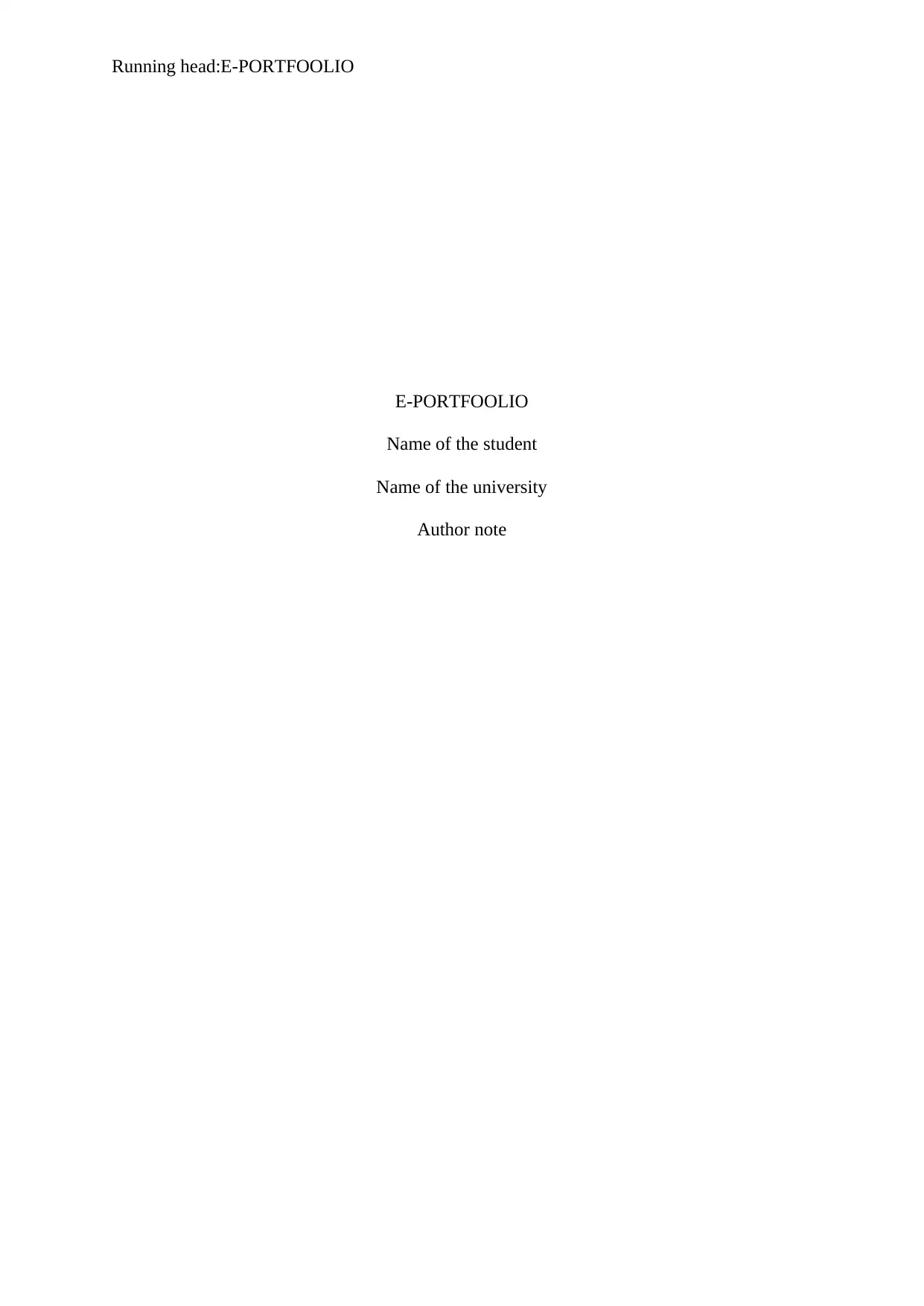
Running head:E-PORTFOOLIO
E-PORTFOOLIO
Name of the student
Name of the university
Author note
E-PORTFOOLIO
Name of the student
Name of the university
Author note
Paraphrase This Document
Need a fresh take? Get an instant paraphrase of this document with our AI Paraphraser
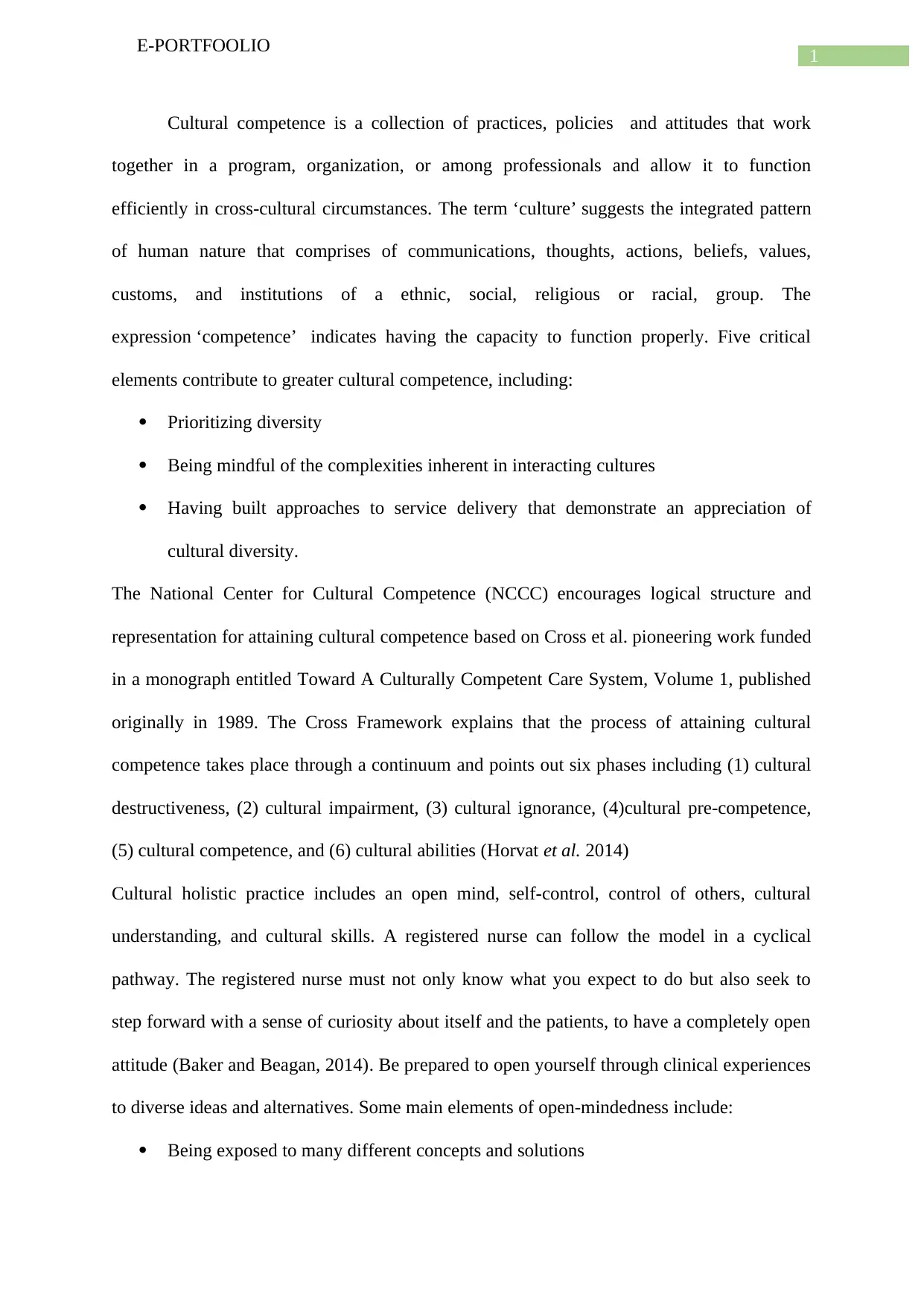
1
E-PORTFOOLIO
Cultural competence is a collection of practices, policies and attitudes that work
together in a program, organization, or among professionals and allow it to function
efficiently in cross-cultural circumstances. The term ‘culture’ suggests the integrated pattern
of human nature that comprises of communications, thoughts, actions, beliefs, values,
customs, and institutions of a ethnic, social, religious or racial, group. The
expression ‘competence’ indicates having the capacity to function properly. Five critical
elements contribute to greater cultural competence, including:
Prioritizing diversity
Being mindful of the complexities inherent in interacting cultures
Having built approaches to service delivery that demonstrate an appreciation of
cultural diversity.
The National Center for Cultural Competence (NCCC) encourages logical structure and
representation for attaining cultural competence based on Cross et al. pioneering work funded
in a monograph entitled Toward A Culturally Competent Care System, Volume 1, published
originally in 1989. The Cross Framework explains that the process of attaining cultural
competence takes place through a continuum and points out six phases including (1) cultural
destructiveness, (2) cultural impairment, (3) cultural ignorance, (4)cultural pre-competence,
(5) cultural competence, and (6) cultural abilities (Horvat et al. 2014)
Cultural holistic practice includes an open mind, self-control, control of others, cultural
understanding, and cultural skills. A registered nurse can follow the model in a cyclical
pathway. The registered nurse must not only know what you expect to do but also seek to
step forward with a sense of curiosity about itself and the patients, to have a completely open
attitude (Baker and Beagan, 2014). Be prepared to open yourself through clinical experiences
to diverse ideas and alternatives. Some main elements of open-mindedness include:
Being exposed to many different concepts and solutions
E-PORTFOOLIO
Cultural competence is a collection of practices, policies and attitudes that work
together in a program, organization, or among professionals and allow it to function
efficiently in cross-cultural circumstances. The term ‘culture’ suggests the integrated pattern
of human nature that comprises of communications, thoughts, actions, beliefs, values,
customs, and institutions of a ethnic, social, religious or racial, group. The
expression ‘competence’ indicates having the capacity to function properly. Five critical
elements contribute to greater cultural competence, including:
Prioritizing diversity
Being mindful of the complexities inherent in interacting cultures
Having built approaches to service delivery that demonstrate an appreciation of
cultural diversity.
The National Center for Cultural Competence (NCCC) encourages logical structure and
representation for attaining cultural competence based on Cross et al. pioneering work funded
in a monograph entitled Toward A Culturally Competent Care System, Volume 1, published
originally in 1989. The Cross Framework explains that the process of attaining cultural
competence takes place through a continuum and points out six phases including (1) cultural
destructiveness, (2) cultural impairment, (3) cultural ignorance, (4)cultural pre-competence,
(5) cultural competence, and (6) cultural abilities (Horvat et al. 2014)
Cultural holistic practice includes an open mind, self-control, control of others, cultural
understanding, and cultural skills. A registered nurse can follow the model in a cyclical
pathway. The registered nurse must not only know what you expect to do but also seek to
step forward with a sense of curiosity about itself and the patients, to have a completely open
attitude (Baker and Beagan, 2014). Be prepared to open yourself through clinical experiences
to diverse ideas and alternatives. Some main elements of open-mindedness include:
Being exposed to many different concepts and solutions
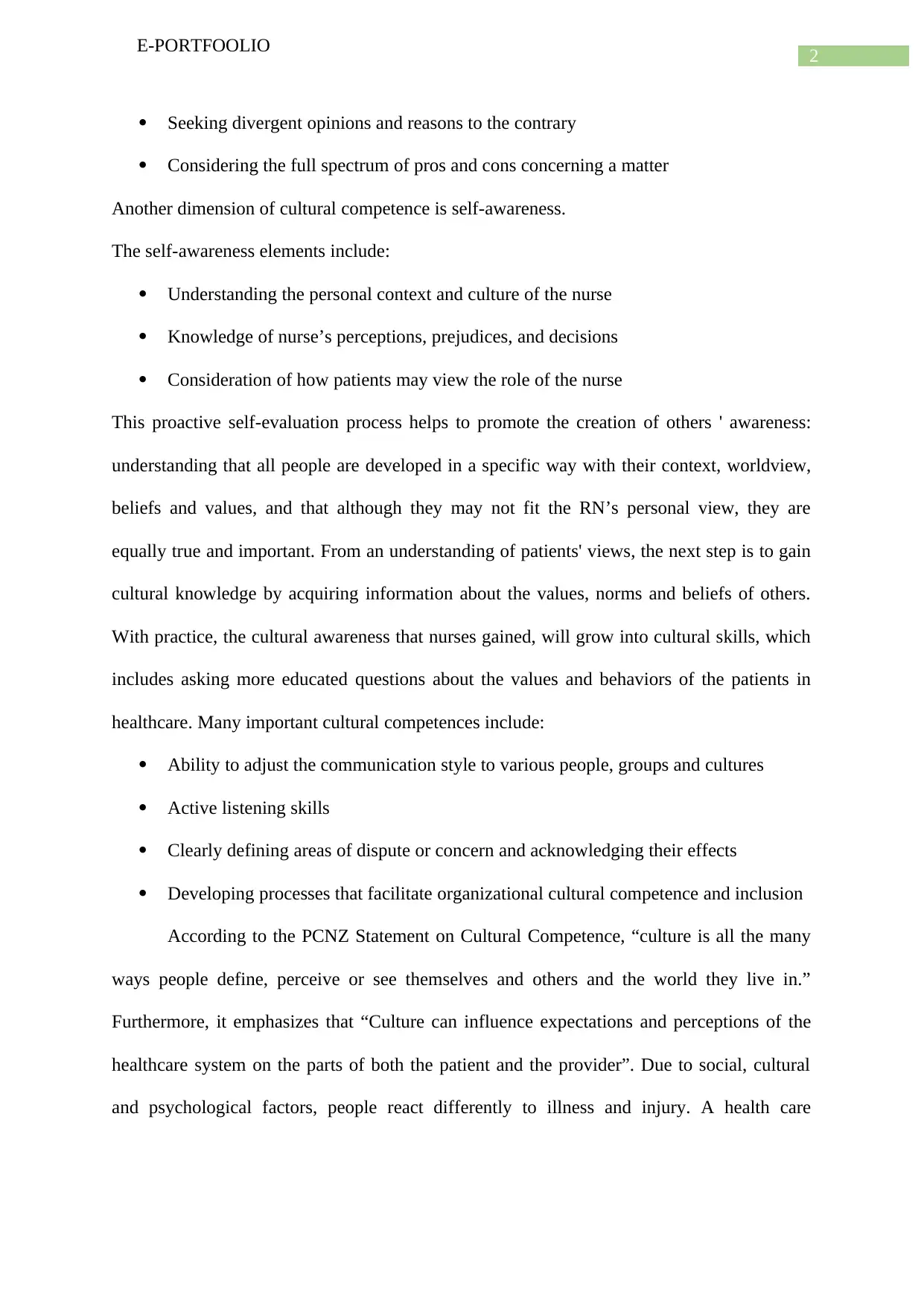
2
E-PORTFOOLIO
Seeking divergent opinions and reasons to the contrary
Considering the full spectrum of pros and cons concerning a matter
Another dimension of cultural competence is self-awareness.
The self-awareness elements include:
Understanding the personal context and culture of the nurse
Knowledge of nurse’s perceptions, prejudices, and decisions
Consideration of how patients may view the role of the nurse
This proactive self-evaluation process helps to promote the creation of others ' awareness:
understanding that all people are developed in a specific way with their context, worldview,
beliefs and values, and that although they may not fit the RN’s personal view, they are
equally true and important. From an understanding of patients' views, the next step is to gain
cultural knowledge by acquiring information about the values, norms and beliefs of others.
With practice, the cultural awareness that nurses gained, will grow into cultural skills, which
includes asking more educated questions about the values and behaviors of the patients in
healthcare. Many important cultural competences include:
Ability to adjust the communication style to various people, groups and cultures
Active listening skills
Clearly defining areas of dispute or concern and acknowledging their effects
Developing processes that facilitate organizational cultural competence and inclusion
According to the PCNZ Statement on Cultural Competence, “culture is all the many
ways people define, perceive or see themselves and others and the world they live in.”
Furthermore, it emphasizes that “Culture can influence expectations and perceptions of the
healthcare system on the parts of both the patient and the provider”. Due to social, cultural
and psychological factors, people react differently to illness and injury. A health care
E-PORTFOOLIO
Seeking divergent opinions and reasons to the contrary
Considering the full spectrum of pros and cons concerning a matter
Another dimension of cultural competence is self-awareness.
The self-awareness elements include:
Understanding the personal context and culture of the nurse
Knowledge of nurse’s perceptions, prejudices, and decisions
Consideration of how patients may view the role of the nurse
This proactive self-evaluation process helps to promote the creation of others ' awareness:
understanding that all people are developed in a specific way with their context, worldview,
beliefs and values, and that although they may not fit the RN’s personal view, they are
equally true and important. From an understanding of patients' views, the next step is to gain
cultural knowledge by acquiring information about the values, norms and beliefs of others.
With practice, the cultural awareness that nurses gained, will grow into cultural skills, which
includes asking more educated questions about the values and behaviors of the patients in
healthcare. Many important cultural competences include:
Ability to adjust the communication style to various people, groups and cultures
Active listening skills
Clearly defining areas of dispute or concern and acknowledging their effects
Developing processes that facilitate organizational cultural competence and inclusion
According to the PCNZ Statement on Cultural Competence, “culture is all the many
ways people define, perceive or see themselves and others and the world they live in.”
Furthermore, it emphasizes that “Culture can influence expectations and perceptions of the
healthcare system on the parts of both the patient and the provider”. Due to social, cultural
and psychological factors, people react differently to illness and injury. A health care
⊘ This is a preview!⊘
Do you want full access?
Subscribe today to unlock all pages.

Trusted by 1+ million students worldwide
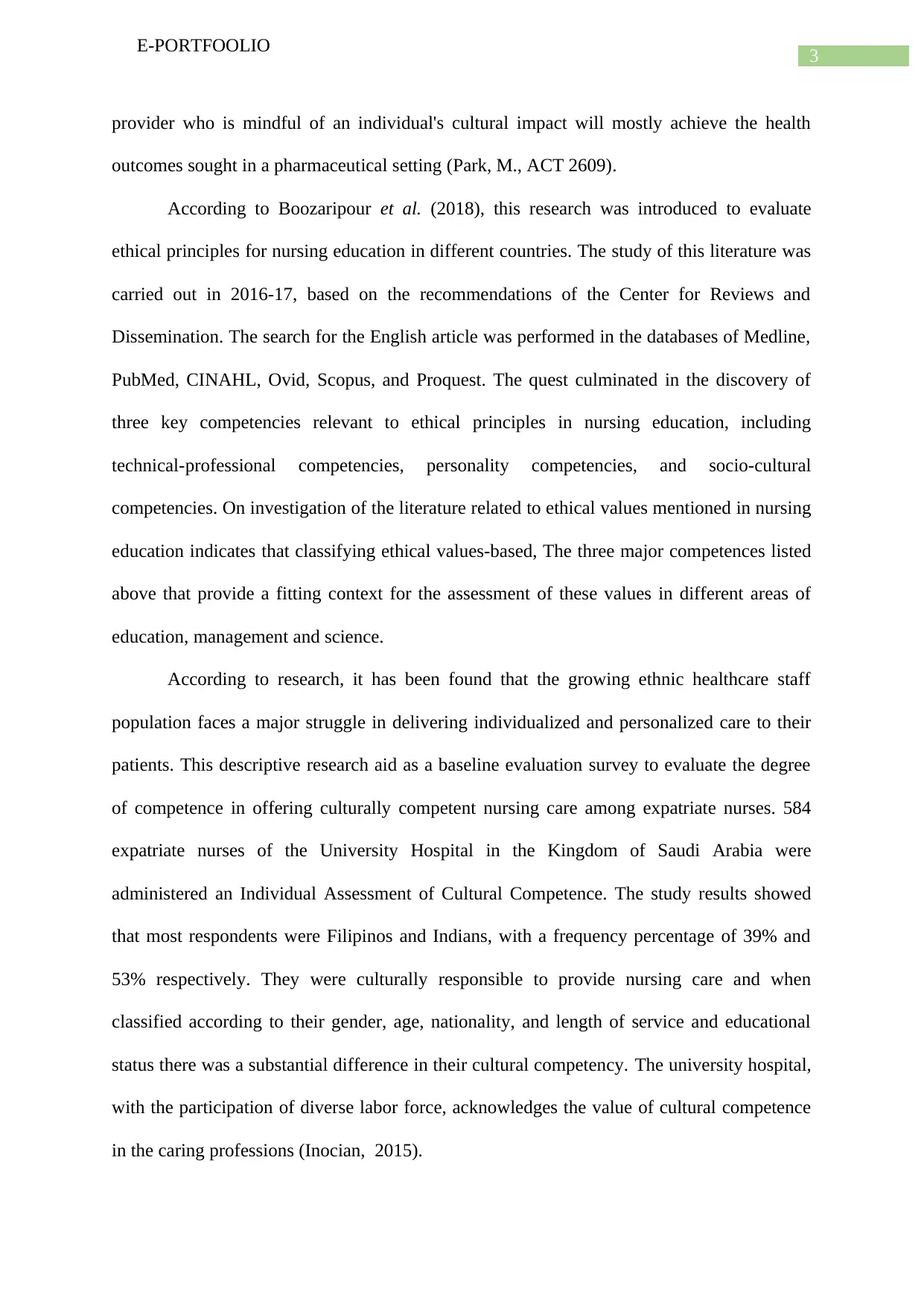
3
E-PORTFOOLIO
provider who is mindful of an individual's cultural impact will mostly achieve the health
outcomes sought in a pharmaceutical setting (Park, M., ACT 2609).
According to Boozaripour et al. (2018), this research was introduced to evaluate
ethical principles for nursing education in different countries. The study of this literature was
carried out in 2016-17, based on the recommendations of the Center for Reviews and
Dissemination. The search for the English article was performed in the databases of Medline,
PubMed, CINAHL, Ovid, Scopus, and Proquest. The quest culminated in the discovery of
three key competencies relevant to ethical principles in nursing education, including
technical-professional competencies, personality competencies, and socio-cultural
competencies. On investigation of the literature related to ethical values mentioned in nursing
education indicates that classifying ethical values-based, The three major competences listed
above that provide a fitting context for the assessment of these values in different areas of
education, management and science.
According to research, it has been found that the growing ethnic healthcare staff
population faces a major struggle in delivering individualized and personalized care to their
patients. This descriptive research aid as a baseline evaluation survey to evaluate the degree
of competence in offering culturally competent nursing care among expatriate nurses. 584
expatriate nurses of the University Hospital in the Kingdom of Saudi Arabia were
administered an Individual Assessment of Cultural Competence. The study results showed
that most respondents were Filipinos and Indians, with a frequency percentage of 39% and
53% respectively. They were culturally responsible to provide nursing care and when
classified according to their gender, age, nationality, and length of service and educational
status there was a substantial difference in their cultural competency. The university hospital,
with the participation of diverse labor force, acknowledges the value of cultural competence
in the caring professions (Inocian, 2015).
E-PORTFOOLIO
provider who is mindful of an individual's cultural impact will mostly achieve the health
outcomes sought in a pharmaceutical setting (Park, M., ACT 2609).
According to Boozaripour et al. (2018), this research was introduced to evaluate
ethical principles for nursing education in different countries. The study of this literature was
carried out in 2016-17, based on the recommendations of the Center for Reviews and
Dissemination. The search for the English article was performed in the databases of Medline,
PubMed, CINAHL, Ovid, Scopus, and Proquest. The quest culminated in the discovery of
three key competencies relevant to ethical principles in nursing education, including
technical-professional competencies, personality competencies, and socio-cultural
competencies. On investigation of the literature related to ethical values mentioned in nursing
education indicates that classifying ethical values-based, The three major competences listed
above that provide a fitting context for the assessment of these values in different areas of
education, management and science.
According to research, it has been found that the growing ethnic healthcare staff
population faces a major struggle in delivering individualized and personalized care to their
patients. This descriptive research aid as a baseline evaluation survey to evaluate the degree
of competence in offering culturally competent nursing care among expatriate nurses. 584
expatriate nurses of the University Hospital in the Kingdom of Saudi Arabia were
administered an Individual Assessment of Cultural Competence. The study results showed
that most respondents were Filipinos and Indians, with a frequency percentage of 39% and
53% respectively. They were culturally responsible to provide nursing care and when
classified according to their gender, age, nationality, and length of service and educational
status there was a substantial difference in their cultural competency. The university hospital,
with the participation of diverse labor force, acknowledges the value of cultural competence
in the caring professions (Inocian, 2015).
Paraphrase This Document
Need a fresh take? Get an instant paraphrase of this document with our AI Paraphraser
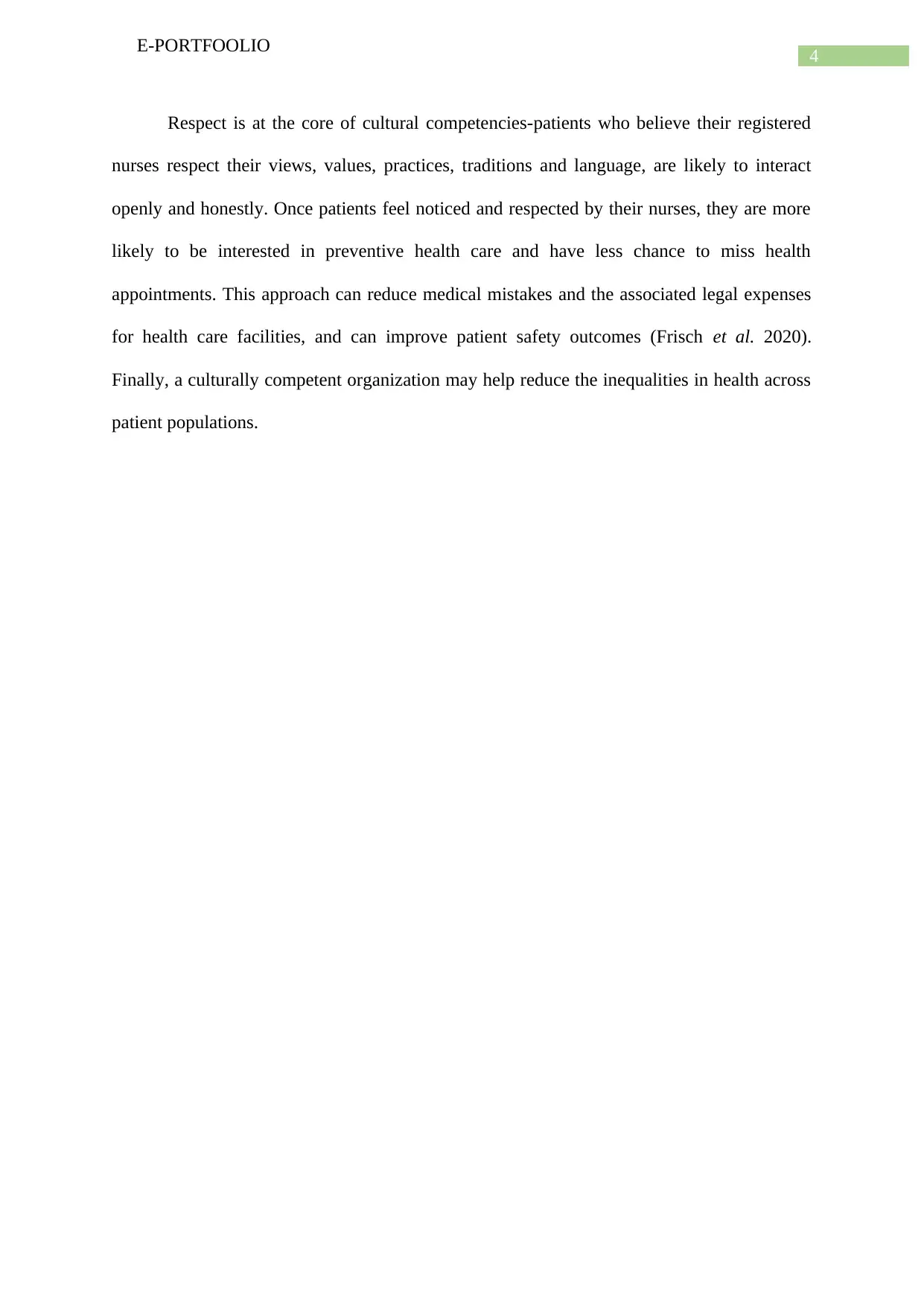
4
E-PORTFOOLIO
Respect is at the core of cultural competencies-patients who believe their registered
nurses respect their views, values, practices, traditions and language, are likely to interact
openly and honestly. Once patients feel noticed and respected by their nurses, they are more
likely to be interested in preventive health care and have less chance to miss health
appointments. This approach can reduce medical mistakes and the associated legal expenses
for health care facilities, and can improve patient safety outcomes (Frisch et al. 2020).
Finally, a culturally competent organization may help reduce the inequalities in health across
patient populations.
E-PORTFOOLIO
Respect is at the core of cultural competencies-patients who believe their registered
nurses respect their views, values, practices, traditions and language, are likely to interact
openly and honestly. Once patients feel noticed and respected by their nurses, they are more
likely to be interested in preventive health care and have less chance to miss health
appointments. This approach can reduce medical mistakes and the associated legal expenses
for health care facilities, and can improve patient safety outcomes (Frisch et al. 2020).
Finally, a culturally competent organization may help reduce the inequalities in health across
patient populations.
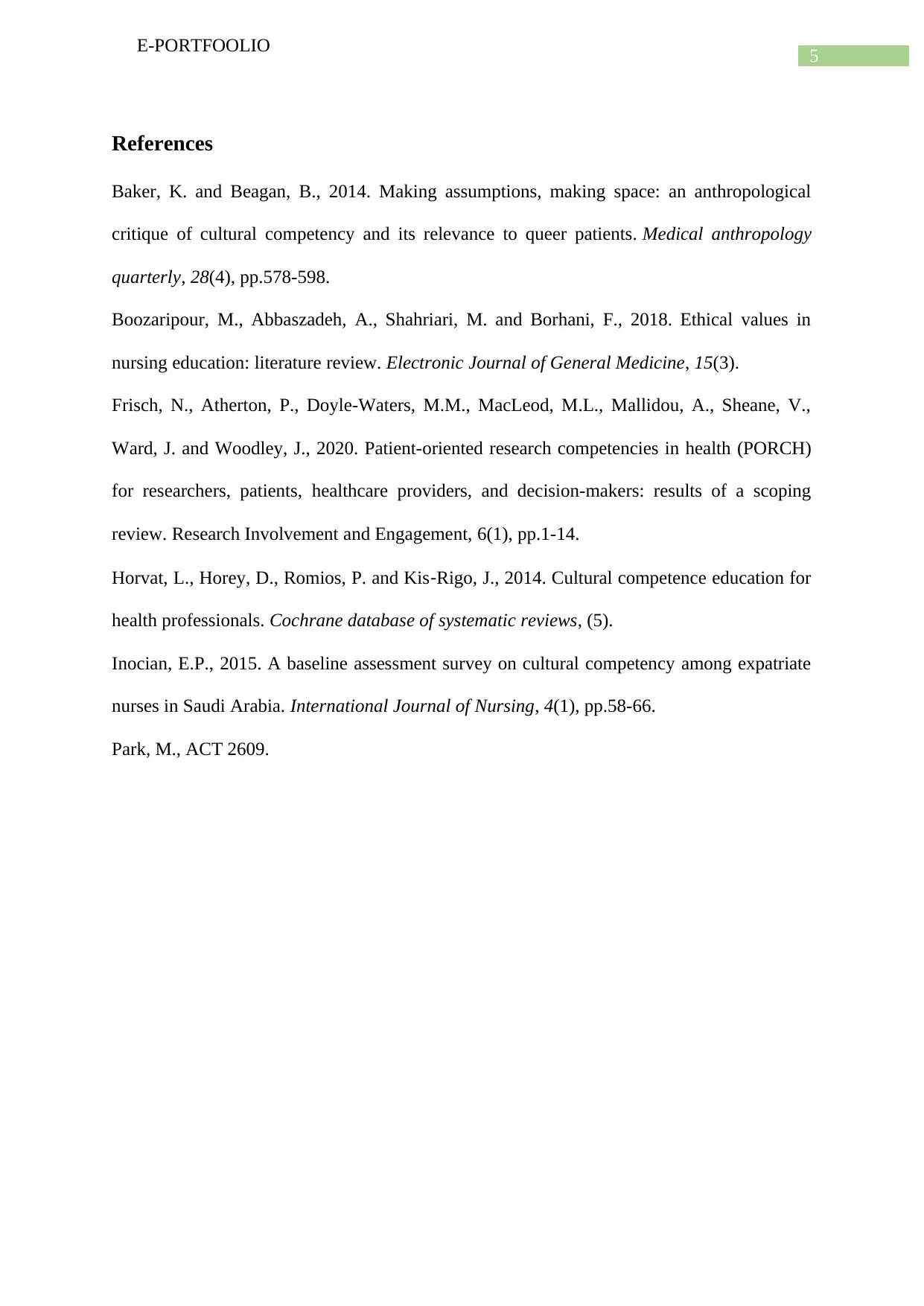
5
E-PORTFOOLIO
References
Baker, K. and Beagan, B., 2014. Making assumptions, making space: an anthropological
critique of cultural competency and its relevance to queer patients. Medical anthropology
quarterly, 28(4), pp.578-598.
Boozaripour, M., Abbaszadeh, A., Shahriari, M. and Borhani, F., 2018. Ethical values in
nursing education: literature review. Electronic Journal of General Medicine, 15(3).
Frisch, N., Atherton, P., Doyle-Waters, M.M., MacLeod, M.L., Mallidou, A., Sheane, V.,
Ward, J. and Woodley, J., 2020. Patient-oriented research competencies in health (PORCH)
for researchers, patients, healthcare providers, and decision-makers: results of a scoping
review. Research Involvement and Engagement, 6(1), pp.1-14.
Horvat, L., Horey, D., Romios, P. and Kis‐Rigo, J., 2014. Cultural competence education for
health professionals. Cochrane database of systematic reviews, (5).
Inocian, E.P., 2015. A baseline assessment survey on cultural competency among expatriate
nurses in Saudi Arabia. International Journal of Nursing, 4(1), pp.58-66.
Park, M., ACT 2609.
E-PORTFOOLIO
References
Baker, K. and Beagan, B., 2014. Making assumptions, making space: an anthropological
critique of cultural competency and its relevance to queer patients. Medical anthropology
quarterly, 28(4), pp.578-598.
Boozaripour, M., Abbaszadeh, A., Shahriari, M. and Borhani, F., 2018. Ethical values in
nursing education: literature review. Electronic Journal of General Medicine, 15(3).
Frisch, N., Atherton, P., Doyle-Waters, M.M., MacLeod, M.L., Mallidou, A., Sheane, V.,
Ward, J. and Woodley, J., 2020. Patient-oriented research competencies in health (PORCH)
for researchers, patients, healthcare providers, and decision-makers: results of a scoping
review. Research Involvement and Engagement, 6(1), pp.1-14.
Horvat, L., Horey, D., Romios, P. and Kis‐Rigo, J., 2014. Cultural competence education for
health professionals. Cochrane database of systematic reviews, (5).
Inocian, E.P., 2015. A baseline assessment survey on cultural competency among expatriate
nurses in Saudi Arabia. International Journal of Nursing, 4(1), pp.58-66.
Park, M., ACT 2609.
⊘ This is a preview!⊘
Do you want full access?
Subscribe today to unlock all pages.

Trusted by 1+ million students worldwide
1 out of 6
Related Documents
Your All-in-One AI-Powered Toolkit for Academic Success.
+13062052269
info@desklib.com
Available 24*7 on WhatsApp / Email
![[object Object]](/_next/static/media/star-bottom.7253800d.svg)
Unlock your academic potential
Copyright © 2020–2026 A2Z Services. All Rights Reserved. Developed and managed by ZUCOL.





